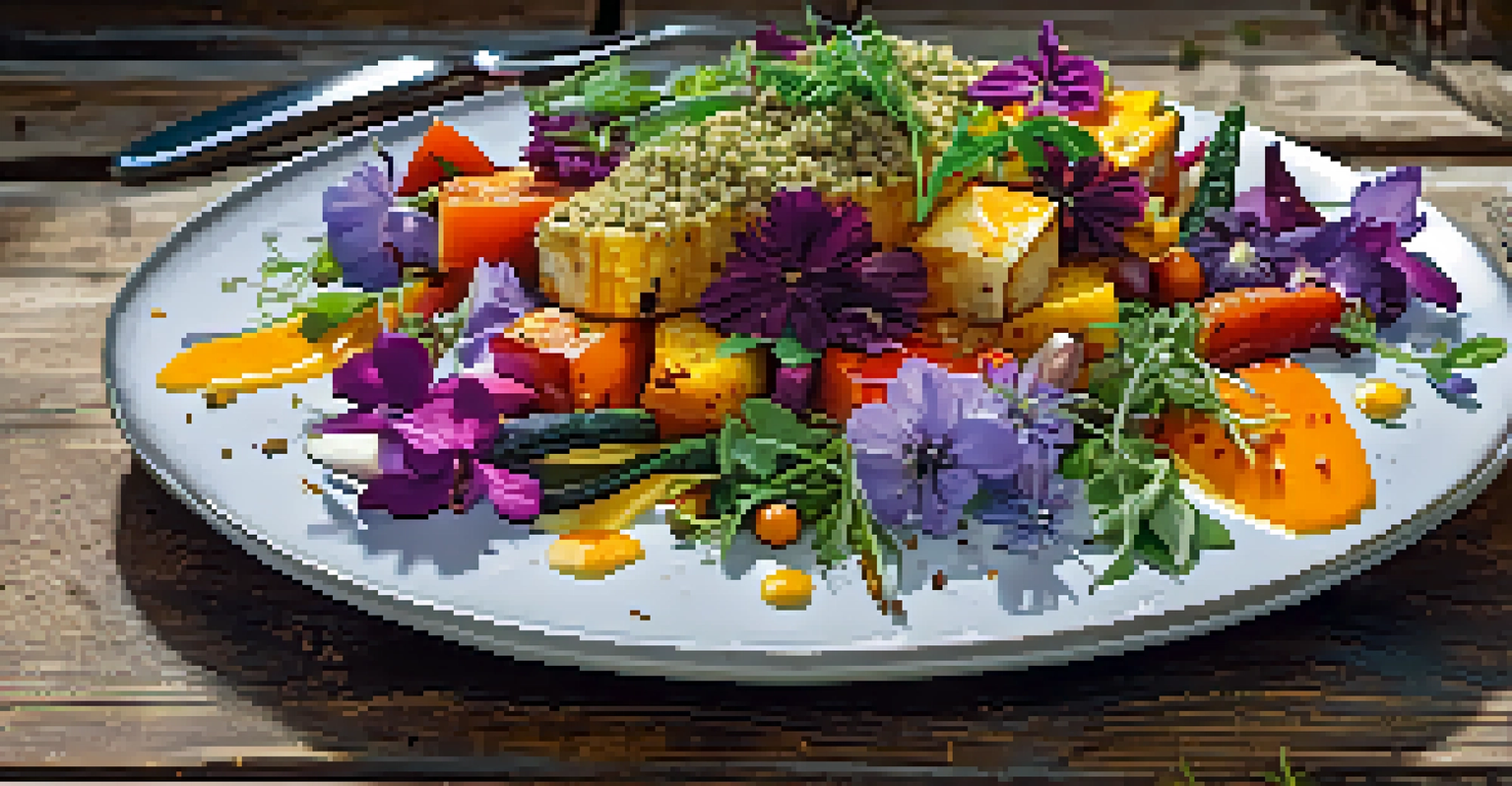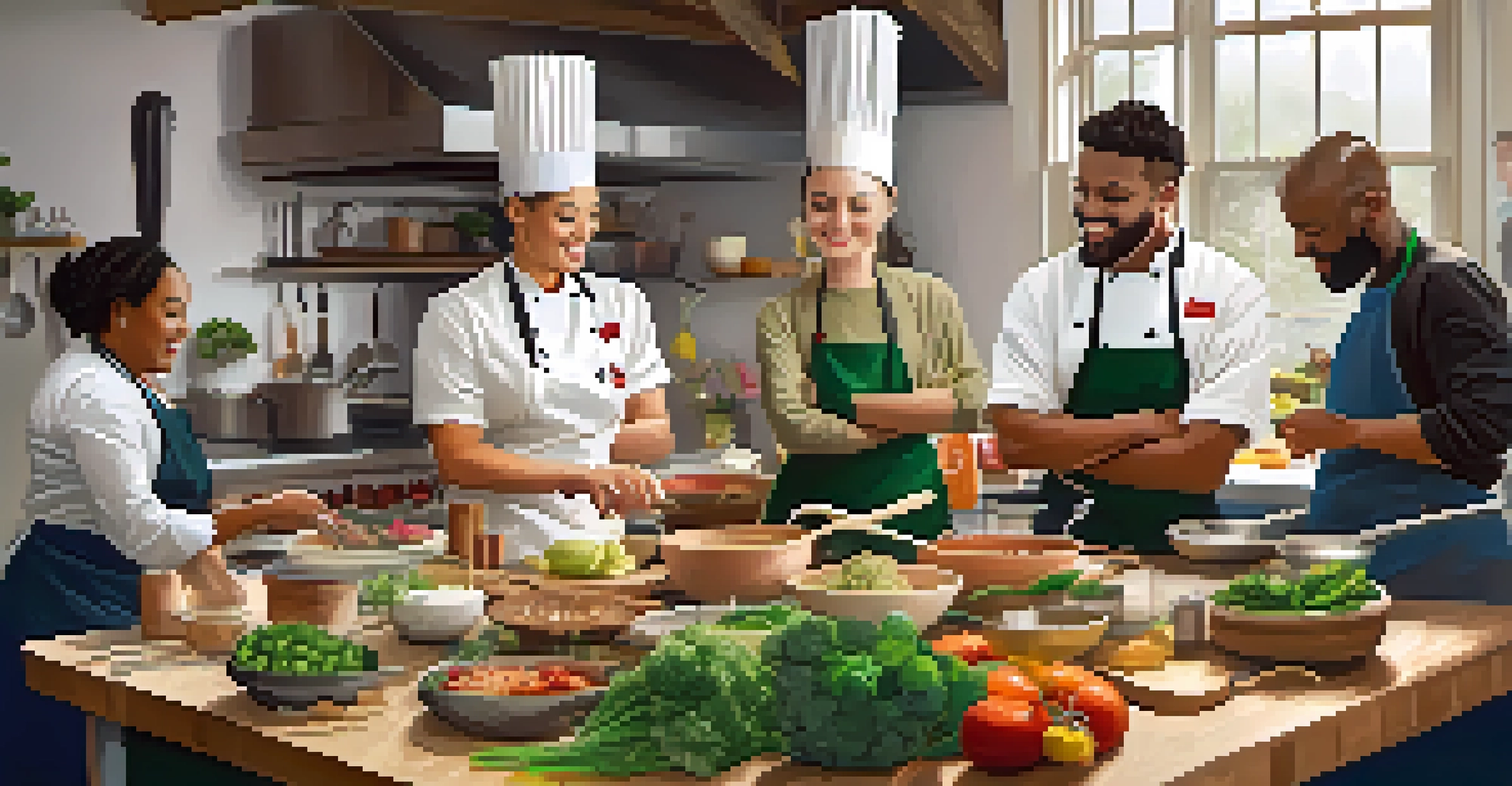How Vegan Culinary Competitions Encourage Plant-Based Eating

Vegan Competitions: A Delicious Revolution
Vegan culinary competitions are more than just cooking contests; they symbolize a shift towards plant-based eating. Chefs from all backgrounds come together to showcase their creativity, turning traditional dishes into innovative vegan masterpieces. This not only highlights the versatility of plant-based ingredients but also makes veganism more accessible and appealing to the general public.
Let food be thy medicine and medicine be thy food.
As participants push the boundaries of flavor and presentation, they inspire audiences to rethink their meals. The excitement around these competitions draws in food lovers who may not yet consider themselves vegan, sparking curiosity about plant-based options. This dynamic environment encourages a broader conversation about food choices and sustainability.
Moreover, these events often celebrate local ingredients, emphasizing the importance of seasonal and organic produce. By showcasing what can be achieved with plants, competitions help demystify vegan cooking, making it approachable for home chefs. This cultural shift is an essential step in promoting healthier eating habits and a more sustainable food system.
Showcasing Creativity in Plant-Based Cooking
One of the most exciting aspects of vegan culinary competitions is the sheer creativity on display. Chefs are challenged to transform everyday ingredients into visually stunning and delicious dishes, showcasing that plant-based cooking can be both delightful and inventive. Participants often experiment with textures and flavors, proving that vegan meals can be just as satisfying as their meat-based counterparts.

For example, the use of aquafaba, the liquid from canned chickpeas, as an egg white substitute has opened doors to creating fluffy meringues and mousses. Such innovations highlight how plant-based cooking can surprise and delight even the most skeptical eaters. This creativity not only impresses judges but also serves as inspiration for home cooks looking to try something new.
Vegan Competitions Spark Creativity
These contests showcase chefs transforming everyday ingredients into innovative, visually stunning plant-based dishes.
As these chefs present their imaginative dishes, they break down stereotypes surrounding vegan food. The vibrant colors and enticing aromas attract attention from food enthusiasts, making plant-based eating seem not just healthy, but also fun and exciting. This shift in perception is crucial for encouraging more people to explore vegan options.
Building Community Through Culinary Challenges
Vegan culinary competitions foster a sense of community among participants and spectators alike. Chefs often share tips, techniques, and stories, creating a supportive environment that encourages collaboration over competition. This camaraderie helps to spread knowledge about plant-based cooking and promotes a collective goal of healthier eating.
Eating is an agricultural act.
Attendees of these events are not just passive observers; they engage with the chefs, ask questions, and often taste the creations themselves. This interaction builds a bridge between chefs and the community, making plant-based cooking feel more inclusive. It empowers individuals to try their hand at vegan recipes, further spreading the movement.
Moreover, these events often partner with local organizations, enhancing community ties and promoting awareness about nutrition and sustainability. By involving local farms and vendors, competitions can highlight the importance of supporting local economies while encouraging a plant-based lifestyle. This holistic approach benefits both individuals and the community as a whole.
Inspiring Change Through Education and Workshops
Many vegan culinary competitions go beyond the cooking itself by incorporating educational workshops. These sessions teach participants about nutrition, sustainable practices, and the benefits of a plant-based diet. By arming attendees with knowledge, competitions help dispel myths about veganism and illustrate its positive impact on health and the environment.
Workshops often feature expert chefs who share their insights on ingredient sourcing, meal prep, and flavor pairing. This not only enhances participants' culinary skills but also encourages them to think critically about their food choices. With each lesson, attendees become more informed advocates for plant-based eating.
Community Engagement Through Food
Vegan culinary competitions foster a sense of community, encouraging interaction and collaboration among chefs and attendees.
As participants leave these events, they carry valuable knowledge back to their everyday lives. Whether they implement new cooking techniques or share their newfound understanding of veganism with friends and family, the ripple effect of these educational components is significant. It's a powerful way to inspire long-term dietary changes.
Highlighting Health Benefits of Plant-Based Meals
Vegan culinary competitions also serve as a platform for promoting the numerous health benefits of plant-based eating. By showcasing nutrient-dense dishes that prioritize fruits, vegetables, whole grains, and legumes, these events highlight how delicious food can also be good for you. Chefs often emphasize the importance of balanced meals, debunking the myth that vegan diets are limiting.
From heart health to weight management, the advantages of plant-based eating are well-documented. Competitions provide a space for chefs to create meals that are not only visually appealing but also rich in vitamins and minerals. This focus on health can motivate attendees to consider incorporating more plant-based meals into their diets.
By making health a central theme, these competitions encourage participants to think about their food choices in terms of nourishment. As people become more aware of the connection between diet and well-being, they are likely to explore plant-based options further. This shift can lead to a broader acceptance of veganism as a viable lifestyle choice.
Promoting Environmental Sustainability through Food
Another crucial aspect of vegan culinary competitions is their focus on environmental sustainability. By promoting plant-based diets, these events highlight the ecological benefits of reducing meat consumption. With climate change and environmental degradation at the forefront of global issues, competitions help raise awareness about sustainable food practices.
Many chefs participating in these events emphasize the use of local, organic ingredients, which reduces the carbon footprint associated with food transportation. This commitment to sustainability not only enhances the flavor of the dishes but also aligns with the values of environmentally conscious consumers. It’s a win-win for taste buds and the planet.
Promoting Sustainability and Health
These events highlight the health benefits of plant-based meals while raising awareness about the environmental impact of food choices.
By showcasing the connection between food choices and environmental impact, these competitions inspire attendees to consider making more sustainable dietary choices. With each delicious bite, they become more aware of their role in fostering a healthier planet. This awareness is essential for building a more sustainable future.
Encouraging Diverse Perspectives on Veganism
Vegan culinary competitions are platforms for diverse voices and perspectives within the plant-based movement. Chefs from various cultural backgrounds bring their unique culinary traditions to the table, enriching the competition experience. This diversity not only enhances the variety of dishes presented but also encourages a broader understanding of what veganism can be.
Through the lens of different cultures, attendees can discover new flavors and cooking techniques that expand their culinary horizons. For instance, traditional dishes from around the world can be veganized, showcasing that plant-based eating is not confined to a single cuisine or lifestyle. This approach fosters inclusivity and encourages everyone to explore veganism in their own way.

By celebrating diversity in vegan cooking, these competitions help to dismantle stereotypes and show that plant-based eating can be vibrant, flavorful, and accessible to all. This broader representation empowers individuals from various backgrounds to embrace veganism and share their own culinary stories. It’s a beautiful reminder that food has the power to connect us all.